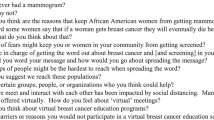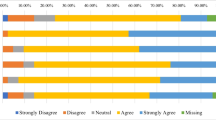Abstract
African-American women experience disproportionately adverse outcomes relative to non-Latina White women after an abnormal mammogram result. Research has suggested medical advocacy and staff support may improve outcomes among this population. The purpose of the study was to understand reasons African-American women believe medical advocacy to be important and examine if and how staff can encourage and be supportive of medical advocacy. A convenience-based sample of 30–74-year-old women who self-identified as African-American/Black/of African descent and who had received an abnormal mammogram result was recruited from community-based organizations, mobile mammography services, and the local department of health. This qualitative study included semi-structured interviews. Patients perceived medical advocacy to be particularly important for African-Americans, given mistrust and discrimination present in medical settings and their own familiarity with their bodies and symptoms. Respondents emphasized that staff can encourage medical advocacy through offering information in general in a clear, informative, and empathic style. Cultural competency interventions that train staff how to foster medical advocacy may be a strategy to improve racial disparities following an abnormal mammogram.
Similar content being viewed by others
References
Adams SA, Smith ER, Hardin J, Prabhu-Das I, Fulton J, Hebert JR (2009) Racial differences in follow-up of abnormal mammography findings among economically disadvantaged women. Cancer 115(24):5788–5797
Jones BA, Dailey A, Calvocoressi L et al (2005) Inadequate follow-up of abnormal screening mammograms: findings from the race differences in screening mammography process study (United States). Cancer Causes Control CCC 16(7):809–821
Maly RC, Leake B, Mojica CM, Liu YH, Diamant AL, Thind A (2011) What influences diagnostic delay in low-income women with breast cancer? J Wom Health 20(7):1017–1023
Jones BA, Reams K, Calvocoressi L, Dailey A, Kasl SV, Liston NM (2007) Adequacy of communicating results from screening mammograms to African American and White women. Am J Public Health 97(3):531–538
Padgett DK, Yedidia MJ, Kerner J, Mandelblatt J (2001) The emotional consequences of false positive mammography: African-American women’s reactions in their own words. Wom Health 33(3–4):1–14
Shelton RC, Goldman RE, Emmons KM, Sorensen G, Allen JD (2011) An investigation into the social context of low-income, urban Black and Latina women: implications for adherence to recommended health behaviors. Health Educ Behav Off Publ Soc Public Health Educ 38(5):471–481
Tejada S, Darnell J, Cho Y, Stolley M, Markossian T, Calhoun E (2013) Patient barriers to follow-up care for breast and cervical cancer abnormalities. J Women’s Health 22:507–518
Moy B, Park ER, Feibelmann S, Chiang S, Weissman JS (2006) Barriers to repeat mammography: cultural perspectives of African-American, Asian, and Hispanic women. Psychol Oncol 15(7):623–634
Somkin CP, McPhee SJ, Nguyen T et al (2004) The effect of access and satisfaction on regular mammogram and Papanicolaou test screening in a multiethnic population. Med Care 42(9):914–926
Wiltshire J, Cronin K, Sarto G, Brown R (2006) Self-advocacy during medical encounter: use of health information and racial/ethnic differences. Med Care 44:100–109
Kerner JF, Yedidia M, Padgett D et al (2003) Realizing the promise of breast cancer screening: clinical follow-up after abnormal screening among Black women. Prev Med 37(2):92–101
Allen JD, Shelton RC, Harden E, Goldman RE (2008) Follow-up of abnormal screening mammograms among low-income ethnically diverse women: findings from a qualitative study. Patient Educ Couns 72(2):283–292
Slaughter-Defoe D (1996) The expressed values scale: assessing traditionalism in lower socioeconomic status African American women. In: Jones R (ed) Handbook of tests and measurements for black populations. Cobb & Henry, Publishers, Hampton, pp 145–164
Deshpande A, Thompson V, Vaungh K, Kreuter M (2009) The use of sociocultural constructs in cancer screening research among African Americans. Cancer Control 16:256–265
Ashing-Giwa K (1999) Health behavior change models and their socio-cultural relevance for breast cancer screening for African American women. Women Health 28:53–72
Elder K, Wiltshire J, McRoy D, Campbell L, Safford G (2010) Men and differences by racial/ethnic group in self advocacy during the medical encounter. J Men’s Health 7:136–144
Rooks R, Wiltshire J, Elder K, BeLue R, Gary L (2012) Health information seeking and use outside of the medical encounter: is it associated with race and ethnicity? Soc Sci Med 74:176–184
Rutten L, Squiers L, Hesse B (2006) Cancer-related information seeking: hints from the 2003 health information national trends survey (HINTS). J Health Commun 11:147–156
Napoles A, Gregorich S, Santoyo-Olsson J, O’Brien H, Stewart A (2009) Interpersonal processes of care and patient satisfaction: do associations differ by race, ethnicity, and language? Health Serv Res 44:1326–1344
Beach M, Hill-Briggs F, Cooper L (2006) Racial and ethnic differences in receipt and use of health information in encounters between patients and physicians. Med Care 44:97–99
Bureau UC (2008–2012) American community survey
Female breast cancer. In: Health WSDo, ed2013.
Bernard HR, Ryan GW (2010) Analyzing qualitative data : systematic approaches. Sage, Los Angeles
Molina Y, Hohl S, Ko L, Rodriguez E, Thompson B, Beresford S (2014) Understanding the patient-provider communication needs of Latina and non-Latina White women following an abnormal mammogram. J Cancer Educ
Fair AM, Wujcik D, Lin JM et al (2010) Psychosocial determinants of mammography follow-up after receipt of abnormal mammography results in medically underserved women. J Health Care Poor Underserved 21(1 Suppl):71–94
Acknowledgments
We thank our participants for their perspectives, time, and effort during this study. For their guidance and assistance with recruitment and data collection, we greatly appreciate Edree Allen-Agbro and Arthur J. Walker. We would also like to thank Marilyn L. Calbert and the staff from the participating clinic sites and programs for their recruitment efforts, including Julie Anne Black, Leanne White, Carri Pender, Jodi Olson, and Kris Edwards. Aminata Trawally and Michelle Nguyen are thanked for their technical assistance with transcription services. This work was supported by the National Cancer Institute under grant numbers P50CA148143, R25CA92408, and K01CA154938-01A1. The opinions or assertions contained herein are the private ones of the authors and are not considered as official or reflecting the views of the National Institutes of Health.
Author information
Authors and Affiliations
Corresponding author
Rights and permissions
About this article
Cite this article
Molina, Y., Hempstead, B.H., Thompson-Dodd, J. et al. Medical Advocacy and Supportive Environments for African-Americans Following Abnormal Mammograms. J Canc Educ 30, 447–452 (2015). https://doi.org/10.1007/s13187-014-0732-9
Published:
Issue Date:
DOI: https://doi.org/10.1007/s13187-014-0732-9




